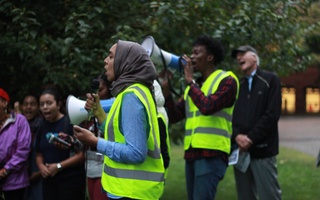{shortcode-5bb7da60fcd09e6885c52baa1a6ad36488003ccf}Eleven Harvard professors and one fellow have signed a statement affirming a commitment to engaging with—and opposing efforts to “silence”—those with opposing views.
The statement, entitled “Truth Seeking, Democracy, and Freedom of Thought and Expression” is co-authored by African and African-American Studies Professor Cornel West and Robert P. George, a Princeton professor. It was published on the program’s website on March 14, and over 600 professors, students, and college affiliates have signed the statement as of Sunday.
“The pursuit of knowledge and the maintenance of a free and democratic society require the cultivation and practice of the virtues of intellectual humility, openness of mind, and, above all, love of truth,” the statement reads.“That’s why all of us should seek respectfully to engage with people who challenge our views. And we should oppose efforts to silence those with whom we disagree—especially on college and university campuses,” it continues.
Although the statement does not mention any one institution or incident, its publication follows a recent highly-publicized confrontation between Middlebury College students and controversial social scientist Charles Murray. Student protesters repeatedly disupted Murray, who had been invited by a conservative student group, pulling fire alarms during his talk, throwing objects at his car when he left, and ultimately injuring a Middlebury professor accompanying Murray.
“It is all-too-common these days for people to try to immunize from criticism opinions that happen to be dominant in their particular communities,” the statement reads. “Sometimes this is done by questioning the motives and thus stigmatizing those who dissent from prevailing opinions; or by disrupting their presentations; or by demanding that they be excluded from campus or, if they have already been invited, disinvited.”
After leaving Harvard for nearly 14 years following a high-profile fight with then president Lawrence H. Summers, West returned at the beginning of the semester to become a “professor of the practice of public philosophy.”
Harvard-affiliated signatories of the statement include Dean of Undergraduate Education Jay M. Harris and former Harvard Medical School Dean Jeffrey S. Flier.
Flier said that he found the statement “entirely unobjectionable” and “positive.”
“This is an issue of broad national significance,” Flier said. “It really is pretty focused on the core issue of what should be the approach of the universities in particular to freedom of speech even on issues that would be seen as controversial or a source of major disagreement.”
Flier described the events at Middlebury as “very visible and very stark” and urged more Harvard affiliates to sign the statement.
“People of goodwill and good intent are beginning to recognize that they’d better say something in defense of free speech and in opposition to violence and disruption on campuses,” said Flier. “From my own point of view, institutions like Harvard which are influential should be in the lead in trying to take strong stance such as the one taken in this statement.”
Kennedy School Professor Jane J. Mansbridge, a signatory of the statement, said she believes that actions such as chanting in order to keep others from being heard should be reserved for situations of “emergency” when other options for communication are exhausted.
“I think there are moments when frustrations and anger over lack of change will lead people to take action like this,” she said.
—Staff writer Mia C. Karr can be reached at mia.karr@thecrimson.com. Follow her on Twitter @miackarr.
—Staff writer William L. Wang can be reached at william.wang@thecrimson.com. Follow him on Twitter @wlwang20.
Read more in News
Faust Kicks Off Asia Trip in SingaporeRecommended Articles
-
Laureates Blast Ford Comment About NobelsTen Nobel laureates, including four from Harvard, yesterday accused President Ford of erroneously taking credit for the number of Nobel
-
Ensign Clark '40 Killed In Action as Naval FlierEnsign Louis C. Clark '40, a United States Navy flier has been killed in action, his wife was informed by
-
In Support of Free Expression on College CampusesThis freedom of expression motion reminds all parties involved that the pursuit of truth is a collaborative one, and that groups with conflicting ideas should seek to understand rather than simply antagonize each other.
-
 Charles Murray, Controversial Alum, Set to Speak at Harvard
Charles Murray, Controversial Alum, Set to Speak at Harvard -
 Charles Murray Event Draws Protest
Charles Murray Event Draws Protest













